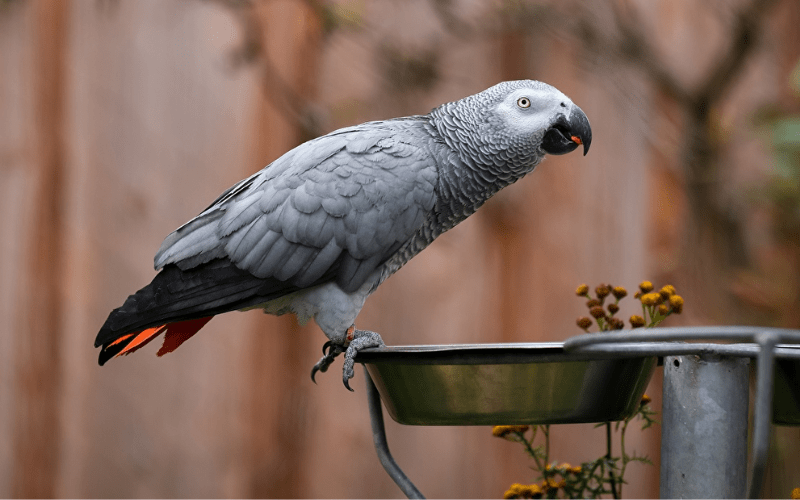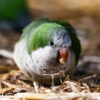- How Long Does A Quaker Parrot Live? - 17 May 2024
- 4 Hacks on Keeping Your Home Clean With Pets - 28 March 2024
- 5 Things to Know Before Bringing Home a New Kitten - 26 March 2024
African Grey Parrots are recognized for their captivating intelligence and outstanding mimicry skills. These birds get attention as the “Einsteins of the parrot world”. It’s a fitting title that shows their exceptional cognitive abilities. They are inborn to the rainforests of West and Central Africa. These parrots are divided into two subspecies: the smaller, darker Timneh Grey and the more widespread Congo Grey.
| Facts | Details |
| Scientific Name | Psittacus erithacus |
| Subspecies | Timneh Grey , Congo Grey (P. e. erithacus) |
| Natural Habitat | Rainforests of West and Central Africa |
| Size | Approximately 12-14 inches in length |
| Weight | 400-650 grams |
| Lifespan | Up to 60 years in captivity |
| Diet | Pellets, fruits, vegetables, nuts, seeds, occasional grains and legumes |
| Intelligence | High; can solve complex puzzles, understand concepts, use tools. |
| Mimicry Ability | Excellent; can mimic human speech and sounds, some mastering hundreds of words |
| Social Needs | High; requires regular interaction and mental stimulation. |
| Common Health Issues | Vitamin A and D3 deficiency, respiratory problems, feather plucking |
| Average Price Range | $2,000 – $8,000+ |
| Conservation Status | Listed on CITES Appendix II, facing threats from habitat loss and pet trade |
African Grey Parrots: Feathered Einsteins of the Bird World
Interesting Facts

- Exceptional Cognitive Abilities
They have exceptional intelligence and problem solving abilities. They can solve complex puzzles and understand the concept of object permanence. They even use tools in their daily activities. Their intelligence is remarkable and they always have advanced learning capabilities.
- Mimicry
They have an excellent ability to mimic human speech and ambient sounds are unparalleled. Some African Greys can imitate vocabularies of hundreds of words and phrases, using them contextually in their interactions. This talent makes them one of the most sought-after pets for bird lovers.
- Lifelong Learners
These birds are epitomes of curiosity. Their desire to explore and experiment is a testament to their intelligence. They thrive in environments with new challenges and experiences, showcasing their adaptability and cognitive growth.
- Strong Emotional Bonds
They are emotionally intelligent and known to form strong ever-lasting bonds. Their bonds with their human companions are remarkable. They look for regular social interaction to maintain their mental health.
- Habitat and Distribution
African Grey Parrots prefer tall trees with dense foliage, which offers them protection and resources. While Timneh Greys are typically found in the smaller western regions, Congo Greys dominate the central areas. However, habitat loss due to deforestation is a threat to their existence.
Dietary Needs

A balanced diet for an African Grey should include:
Fruits & Veggies
Variety of fruits such as apples, bananas, berries, melons, and pears are good for parrots. Don’t feed avocado and chocolate as they are toxic to parrots. Only feed those fruits which contribute only 20% of their daily diet. Veggies are essential for vitamins and minerals. They can eat leafy green veggies like kale, spinach, Swiss chard, carrots, sweet potatoes and squash. Veggies can constitute around 10-15% of the diet.
Nuts and Seeds
Nuts like almonds, walnuts and pecans are good in moderation as a treat because these are high in fibre. Similarly seeds should be given carefully due to their high fat content.
Grains
Cooked grains like brown rice, quinoa, barley and whole wheat pasta can be offered occasionally. Grains provide additional vitamins and minerals which are sufficient for their health.
Calcium
They will be needing more calcium than other parrots. Cuttlebone or mineral blocks can be provided to meet their calcium needs.
Water
Fresh clean water should be available at all times. Change water daily to prevent contamination.
Important Dietary Considerations
- Vitamin A and D3: African Greys are prone to Vitamin A deficiency. Always include foods high in this vitamin such as sweet potatoes and carrots. Vitamin D3 is also important especially for indoor birds with limited exposure to natural sunlight.
- Avoid Certain Foods: Avocado and chocolate, caffeine, alcohol, and foods high in fat, salt, and sugar should be avoided.
- Moderation and Variety: Balance and variety are key to a healthy diet. Rotating foods prevents boredom and ensures a range of nutrients.
- Supplements: Consult a veterinarian for dietary supplements, especially if your parrot’s diet lacks diversity.
Care and Keeping
Here’s a list of African Grey Parrot care keeping
Demanding Pets
African Greys demand proper attention, mental stimulation, and time. They can easily become bored and frustrated leading to behavioural issues.
Regular Interaction
Interaction is not just a luxury and it’s a necessity for African Greys. Daily playtime, teaching tricks, and conversing are crucial for their emotional well-being.
Veterinary Care
Regular check-ups with a veterinarian experienced are essential to monitor their health and address any potential issues.
Price and Adoption

Here’s a list of African Grey Parrot care price and adoption
Costly Companions
African Grey Parrots come with a hefty price tag ranging from $2,000 to $8,000 or even higher. This cost doesn’t include the ongoing expenses of their care.
Consider Adoption
Adoption can be more affordable and humane providing a loving home to a needy bird.
Additional Considerations
These Parrots have a rich history as pets dating back centuries. Their intelligence and mimicry have made them favourites among royalty and common folk.
Common Health Problems
Parrots can suffer from various health issues including feather plucking, respiratory problems and Vitamin A deficiency. Regular vet visits and a balanced diet are important.
Training and Socializing Tips
Training these parrots requires patience and consistency. Positive techniques such as treats and praise can be highly effective. Socialization is important for developing well-rounded and friendly birds.
Also Read: Shamrock Macaws: A Close Look
List of Costs and Supplies for Caring for African Grey Parrots
Here’s a list of African Grey Parrot care supplies and an estimated range of costs
| Cage | Cost: $200 to $800 |
| Cage Accessories | Cost: $50 to $150 |
| Bedding | Cost: $10 to $20 per month |
| Nutritious Parrot Pellets | Cost $20 to $40 |
| Fresh Fruits and Vegetables | Cost $20 to $40 per month |
| Cuttlebone or Mineral Blocks | Cost: $5 to $10 |
| Grooming Supplies | Cost: $10 to $20 |
Wrap up
African Grey Parrot is both rewarding and challenging. They are intelligent, curious birds who can form deep connections and are exceptional companions. However responsible ownership demands dedication, knowledge, and commitment to their care and happiness.
















